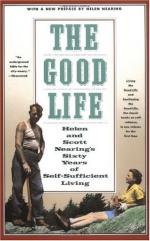
|
| Name: _________________________ | Period: ___________________ |
This test consists of 15 multiple choice questions and 5 short answer questions.
Multiple Choice Questions
1. Upon arriving in Vermont, who sold the Nearings milk?
(a) The local grocery.
(b) The previous owners
(c) The Lightfoots.
(d) The Nearings had cows.
2. When the Nearings started their first garden in Vermont, what caused a quagmire and nearly ruined the garden?
(a) A spring on the high side of the garden.
(b) Deer that kept eating the apples.
(c) The threat of fire.
(d) A sinkhole the size of a large truck.
3. How did the Nearings divide their "jobs to be done" on their card index of activities?
(a) By "wood and fuel jobs" and "canning."
(b) By "building projects" and "garden projects."
(c) By "clear weather jobs" and "rainy day jobs."
(d) By "cash labor" and "free labor."
4. What happened to the fords that the Nearings built when they first moved to Vermont?
(a) They did not drain the water.
(b) They cracked and broke.
(c) They heaved and came out of the ground.
(d) They worked great.
5. What did the Nearings have to do to pick their sweet peas?
(a) Bend and kneel on the ground.
(b) Hoe the row and pull them out.
(c) Put at ladder up in a tree.
(d) Stand on a stool or ladder.
6. What was 7 miles from the farm in Vermont?
(a) The grocery store.
(b) The ski resorts.
(c) The Jamaica Post Office.
(d) The movie theater.
7. How old, according to the Nearings, were they when they decided to move to Vermont?
(a) In their 20s.
(b) 68 and 69.
(c) 70.
(d) Approaching fifty.
8. What, according to the Nearings, is important about keeping an axe?
(a) Keep it in the garden so it can be found and used.
(b) Keeping it sharp.
(c) Keep it inside the house.
(d) Let Helen keep it.
9. When the Nearings talked about being vegetarians, which neighbors changed their habits and also became vegetarians?
(a) None.
(b) Most of their neighbors.
(c) 2 close friends.
(d) Only a neighbor man who stayed with them for a long while.
10. What did the Nearings eat for breakfast?
(a) Ice cream.
(b) Bacon and eggs.
(c) Fruit, sunflower seeds, and a black molasses drink or tea.
(d) Fresh fruit and yogurt.
11. What did the Nearings grow under a heavy hay mulch that required no hoeing, no bugs, no spraying, and almost no digging?
(a) Raddishes.
(b) Carrots.
(c) Potatoes.
(d) Corn.
12. What did Walter Twing do on Saturdays?
(a) He collected sap from the trees.
(b) He worked in his garden.
(c) He tended his horses.
(d) He did not work.
13. What newspapers got on board to help the citizens of the valley then the mail was canceled?
(a) The Kansas City Star.
(b) The Brattleboro Reformer and the Bennington Banner.
(c) The Chicago Tribune.
(d) The New York Times.
14. What did the Nearings sell as a cash crop in Vermont?
(a) Dairy.
(b) Cattle.
(c) Vegetables.
(d) Syrup and sugar.
15. What was the relationship between the Nearings and law enforcement?
(a) Scott was a volunteer policeman.
(b) They were constantly harrassed by the area police.
(c) They were good friends with the sheriff.
(d) They never saw a uniformed policeman pass along the dirt road in front of their house.
Short Answer Questions
1. How did the Nearings ask workers how much they wanted for a job on the farm?
2. What does healthy soil teem with?
3. Why did the Nearings NOT join a communal experience?
4. How was the Sunday morning musical events divided?
5. How did the Nearings keep records of their projects at the farm?
|
This section contains 624 words (approx. 3 pages at 300 words per page) |

|




